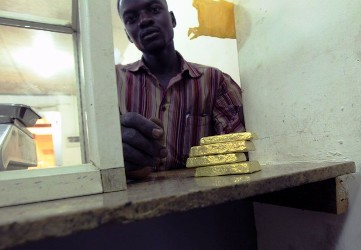Sudan pins economic hope on gold prospects
By Toby Collins
July 26, 2012 (LONDON) – In the wake of its worsening economic crisis, Sudan hopes that gold exports can take up some of the economic slack created by lost oil revenues.

Although gold mining remains a predominantly cottage industry, with up to 250,000 Sudanese seeking their fortune in the unforgiving desert in the north of Sudan, 600 contracts have been issued to private mining companies and new mining areas are to be opened.
In 2011 Sudan reportedly produced 33.7 tonnes of gold. In the same year the world’s biggest gold producer was China, producing 355 tonnes.
When South Sudan seceded in 2011, it took with it more than three-quarters of what was Khartoum’s oil producing capacity. However, Khartoum retained the strategic clout to keep afloat, as it owns much of the infrastructure, including the pipeline which transported oil from landlocked South Sudan to Port Sudan on the Red Sea.
In January South Sudan halted its 350,000 barrels per day in oil production. It was a move considered by some to be economic suicide and by others as a pragmatic statement of political and economic independence that brought Juba and Khartoum back to the negotiating table.
Juba claimed that fees Khartoum was charging to use its oil infrastructure were extortionate and refused to pay. Khartoum responded by confiscating South Sudanese oil.
A series of talks held in an increasingly tense atmosphere were unsuccessful. Other issues unresolved since the signing of the peace agreement that ended the Sudanese civil war in 2005, culminated in a return to military conflict in March. There are signs that the current round of talks hosted in Addis Ababa may quell the mutual acrimony, but the situation continues to fluctuate.
Most recently Juba’s spokesperson, Pagan Amum, said he was going into this week’s round of negotiations with an offer of US$9.10 and US$7.26 per barrel for the usage of Sudan’s two pipelines and US$3.2 billion in annual financial assistance. Khartoum previously demanded US$36 per barrel.
In order to buffer the economic blow of the halting of oil production both Juba and Khartoum have implemented austerity measures.
Despite allegations of tribalism and corruption scandals Juba retains popular support amongst a populous still giddy with patriotism and reeling from generations of underinvestment, underdevelopment and conflict in the one-year-old nation. Their austerity measures have been met with widespread stoicism.
Khartoum, on the other hand, now faces renewed dissent. Perhaps currently in a lull during Ramadan, the protesters have been on the streets since June, calling for regime change; accusing the government of human rights abuses, repression, unjust internal conflicts and economic mismanagement.
Although the potential US$3 billion in gold exports falls short of the US$5 billion oil brought to Sudan in 2010, it is hoped that it can plug the gap while Khartoum continues its wrangling with Juba at the negotiating table.
Despite the inflation it causes, much of Sudan’s gold is bought from individual traders by Khartoum’s central bank at above international trading prices, in order to secure much-needed dollars from importers: dollars that would have come from South Sudan’s oil.
Canadian mining firm La Mancha Resources recently did a deal with an Egyptian company to develop Sudan’s biggest gold mine; the majority state-owned Hassai. However, trade sanctions on Sudan due to its links with terrorism; a lack of local expertise; depleted surface reserves; and a proliferation of domestic red tape continue to impinge on the viability of investing in Sudan’s gold mining industry.
(ST)
